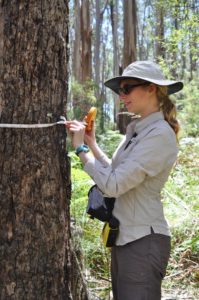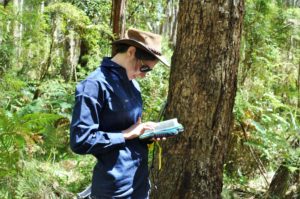Understanding koalas, stress and habitat declines
Founded by the Zeno Karl Schindler Foundation and supported by the University of Queensland, a very important scientific project is underway at the Conservation Ecology Centre.
 As koala habitat continues to decline we are continuing to work towards a a better understanding of the situation in order to contribute to future management.
As koala habitat continues to decline we are continuing to work towards a a better understanding of the situation in order to contribute to future management.
Supervised by Professor Clive McAlpine and the research team at the CEC, Dr Manuelle Cottin and Research Assistant Nicole Davies will be collecting data during the next month, both at CEC and across the neighbouring woodlands, both on private land and through the Great Otway National Park. By collecting data on the condition of koalas and of their trees, researchers will be able to gain more knowledge on the diet and the stress levels of koalas in different habitats.
 More news about the results of this study soon!
More news about the results of this study soon!
This year, with your help, we rediscovered endangered Tiger Quolls in the Otways and initiated the Otways Conservation Dogs Project and Humane Fox Management Program. We have embarked upon an ambitious program, investigating and addressing koala habitat decline – an issue seriously threatening koalas in Victoria. You have also helped us to rescue and rehabilitate hundreds of injured and orphaned animals so that they can be returned to the wild.
Our supporters play an incredibly important role in the work of the CEC and we deeply value your involvement and commitment to wildlife conservation. Thanks to you, we have purchased a key piece of land at Cape Otway – the first stage in creating a vital wildlife corridor. It is a very special Christmas gift for the wildlife of the Great Ocean Road!
Spoil someone special with a Great Ocean Ecolodge Gift Voucher – order now. Perhaps a piece of handmade jewellery to support Tiger Quoll conservation? See the range and place an order here. These gifts are great under the tree or can be posted easily – Gift Vouchers can even be sent electronically for super Christmas speed. Because all profits go directly to support CEC conservation programs you will be giving a gift to the wildlife at the same time!

Can you see Father Christmas yet?
Thank you for sharing 2012 with us. Warmest wishes for the festive season and a fabulous New Year!
Learn more about the Tiger Quoll Conservation Program and Otways Conservation Dogs
Learn more about the Koala Conservation Program
Learn more about Manna Gum Reserve
Support Australian wildlife this Christmas – make a donation
At Cape Otway on the Great Ocean Road manna gum woodlands are declining rapidly and hungry koalas gaze down from skeletons of dead and dying trees. The local community have observed the progression with mounting alarm and are working together to address it.
The Conservation Ecology Centre, based at Cape Otway, is investigating the issue through an Australian Government Biodiversity Fund Grant. It seems the issue is more complicated than simply the impact of koalas, but how complex is it?
 Koalas are native to the region, though historically they were in lower numbers than at present, and in the 1980’s additional animals were released at Cape Otway from French Island. The trees have been declining over the last ten years.
Koalas are native to the region, though historically they were in lower numbers than at present, and in the 1980’s additional animals were released at Cape Otway from French Island. The trees have been declining over the last ten years.
Due to the size of both the area and the koala population, sterilisation of koalas is unlikely to result in significant decreases in the population or improvements in the woodlands at Cape Otway. Translocation of koalas to other areas of habitat is also problematic, with few, if any, suitable areas available and the potential to spread the problem. The cost of either approach would be huge as would be the stress to the individual koalas. The future of the koalas and the manna gums depends instead on careful management of the habitat.
One of the greatest concerns for the future is the lack of young trees. “While the older trees are declining and dying, there are no young trees growing to replace them,” Dr Jack Pascoe, Conservation Coordinator at the Conservation Ecology Centre explains. “In the most affected areas the natural understorey of native grasses and wildflowers has been overtaken by coastal scrub, but, where seedlings have been hand planted in areas without coastal scrub these have grown into young trees which are thriving and coping with the koalas well.”
The Conservation Ecology Centre recently held a forum attended by experts from around the country including eucalypt dieback experts, koala ecologists, botanists and leaf chemists to consider these issues. Potential causes for these issues were considered and the CEC has initiated investigations into them.
“Fire is probably a very important element in this ecosystem and it has been missing for a long time now. This lack of burning means that coastal scrub is now expanding into areas which have traditionally been woodlands. The grassy understorey of the woodland is being replaced by shrubs, inhibiting the trees and preventing recruitment. Reintroducing fire to the landscape may well initiate many processes such as recruitment of young trees” said Dr Pascoe.
“Koalas favour some trees over others and understanding this may assist with helping trees to withstand koala pressure. Eucalypts like the manna gum produce chemicals to deter animals from eating them and the CEC is working with the University of Western Sydney to study the relationship between leaf chemistry and tree health. Improving the health of a tree could encourage it to produce more defences against koala browsing.”
“The CEC’s research team is already investigating effective ways of initiating recruitment and tree health with small contained burning efforts and the potential for simulating the effects of fire. We also plan to research the leaf chemistry of manna gums in all growth stages and under varying degrees of tree stress and decline to gain insights into the stress process and its impact on browsing pressure” explained Dr Pascoe.
“The trees are dying and we need to act quickly” said CEO Lizzie Corke, “We are collecting seed from surviving trees, planting manna gum seedlings and building resilience in the koala habitat across Cape Otway. We are looking forward to extending this work across Manna Gum Reserve, a property the CEC is working towards purchasing with help from The R.E. Ross Trust (we still need to raise $28,000). Research is vital for understanding the issue and we hope that our findings will guide us in combating the decline of the woodlands and effectively restoring this threatened habitat as well as assisting with managing similar issues around the country.”